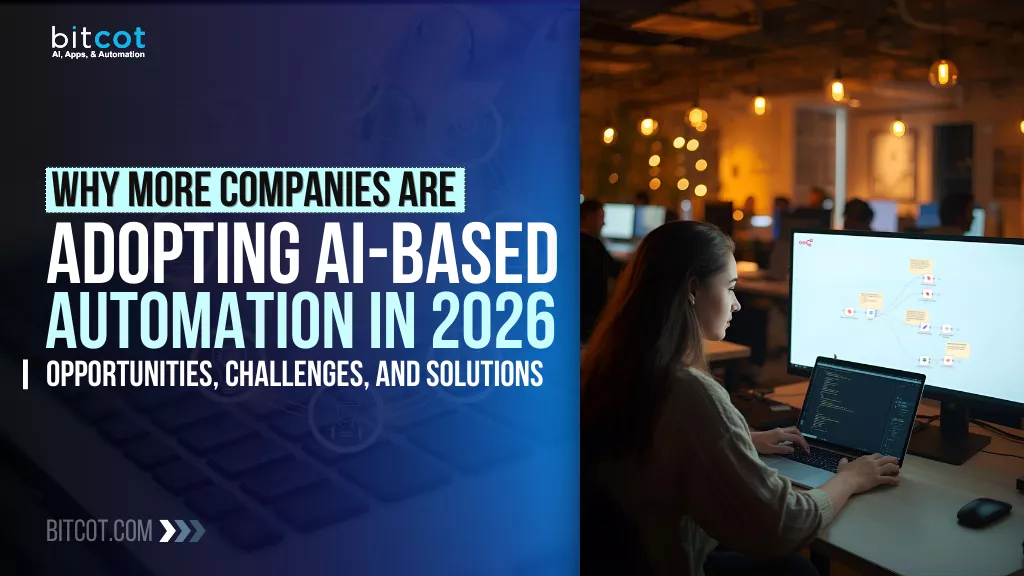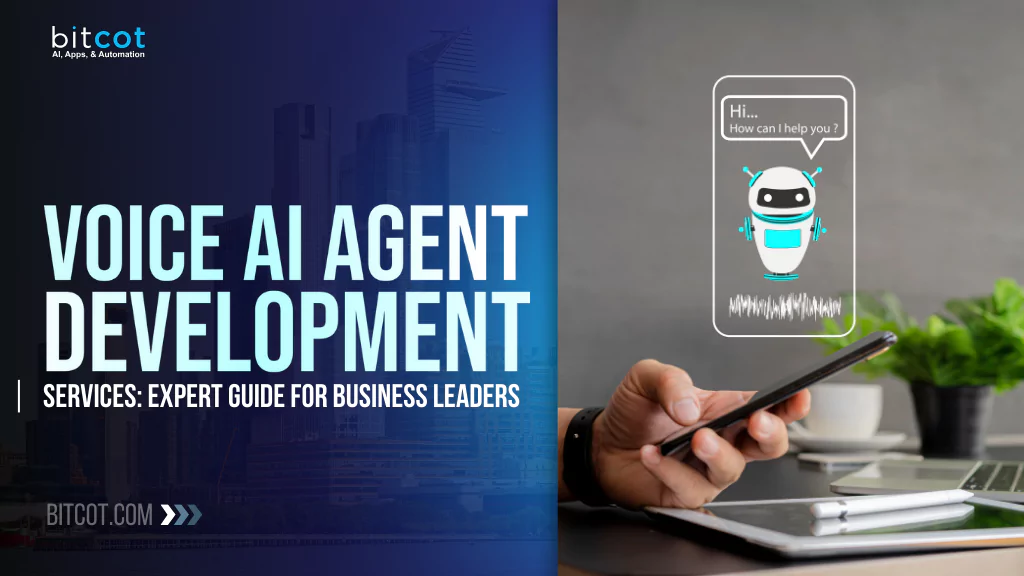
Customer service calls are drowning your team.
Support tickets pile up faster than your agents can clear them, and frustrated customers are left waiting. Meanwhile, your competitors? They’re answering questions instantly, day or night, without a single human lifting the phone.
It sounds like something out of a sci-fi movie, but it’s not. It’s today’s competitive reality, powered by voice AI agents. These smart, conversational systems are changing the rules of customer engagement, cutting costs, and unlocking new levels of service efficiency.
If you’re a business leader trying to stay ahead, the question isn’t whether voice AI agents will shape the future of customer support; it’s how quickly you can harness them.
This guide will walk you through everything you need to know about voice AI agent development services, so you can make confident, informed decisions that put your business in front.
What Are Voice AI Agent Development Services and Why Your Business Needs Them Now?
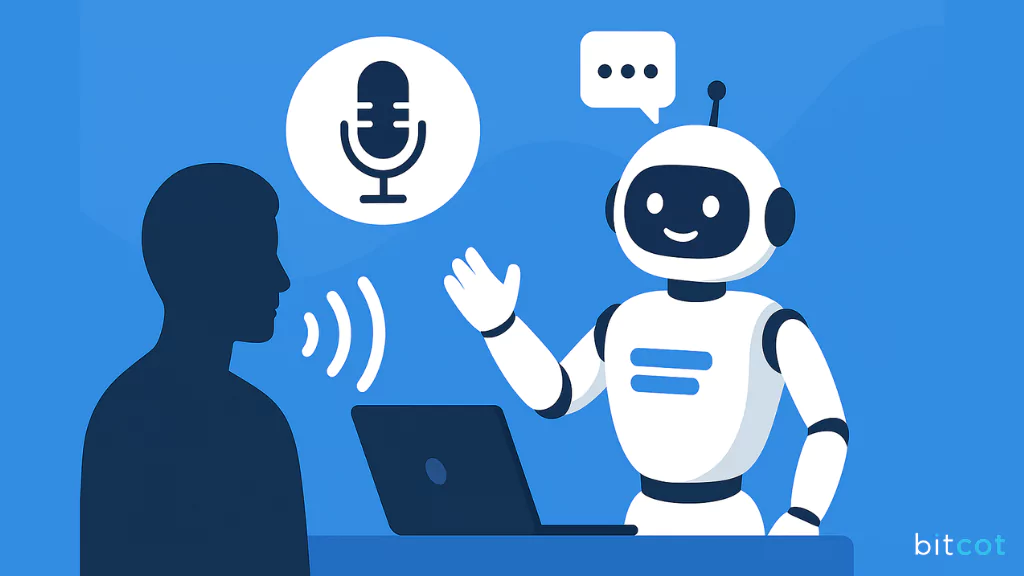
Voice AI agents are not just another customer service tool; they represent a fundamental shift in how businesses interact with people.
At their core, these systems are sophisticated conversational technologies that can understand, process, and respond to human speech in real-time.
Unlike traditional chatbots, which are limited to typed inputs and often stumble on anything outside of pre-programmed responses, voice AI agents bring natural, intuitive interactions into the customer experience.
They’re powered by advanced natural language processing (NLP), machine learning, and speech recognition, allowing them to carry on conversations that feel far less mechanical and far more human.
This difference matters because voice is the most natural way we communicate. Customers don’t want to fumble through clunky menus, repeat themselves three times, or feel like they’re talking to a wall. They want fast, seamless resolutions, without friction.
A well-developed voice AI agent delivers exactly that. It listens, understands intent, adapts to context, and provides answers instantly, whether the inquiry comes at noon or midnight.
Here’s the reality: manual customer service operations cannot keep up with modern business demands. Teams are overloaded, wait times are too long, and customers are less patient than ever. Every extra minute someone spends on hold is a chance for them to click over to a competitor who’s already offering immediate answers.
Every after-hours voicemail that goes unreturned is more than just a missed opportunity; it’s potential revenue slipping through the cracks and a small blow to your brand’s reputation.
This is why the move toward automation isn’t optional anymore. It’s not about replacing humans; it’s about scaling in a way that traditional models simply can’t match. Human agents excel at empathy, relationship building, and handling complex, nuanced cases.
Voice AI agents complement that by taking on the repetitive, high-volume, time-sensitive interactions that otherwise bog down your team. Together, they create a customer service experience that is both efficient and deeply human where it counts.
Understanding these fundamental challenges is step one. The next step is acknowledging why older approaches to customer support continue to fail, and how voice AI provides the framework for a smarter, more resilient solution.
Why Traditional Customer Service Models Are Failing Modern Businesses
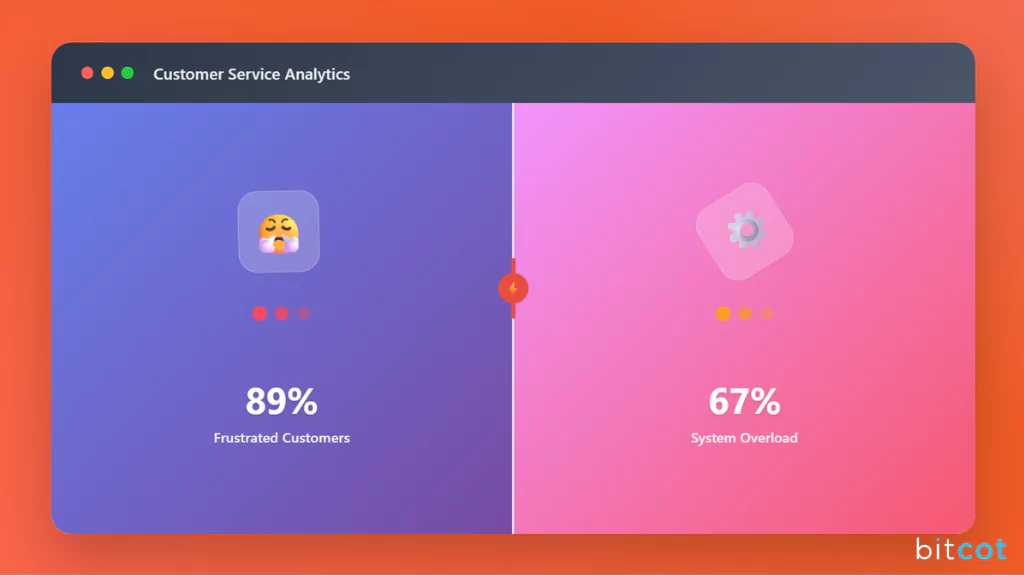
The truth is simple: the old way of doing customer service can’t keep up with the pace of modern business.
For years, companies have leaned on large call centers and human-heavy support teams to manage customer needs. But that model is cracking under pressure.
Let’s break down the pain points business leaders are facing every single day:
- Resource Limitations: Hiring, training, and retaining skilled agents isn’t just time-consuming; it’s expensive. Beyond salaries, there are benefits, onboarding costs, management overhead, and the technology required to keep teams running. For every new hire, you’re not just paying for a chair in the office; you’re investing thousands into a system that may still fall short.
- Scalability Constraints: Human agents can only do so much. One conversation at a time, one customer at a time; that’s the limit. During peak hours, product launches, or unexpected surges in demand, queues grow long, customers grow impatient, and frustration rises. What happens next? Abandoned calls, negative reviews, and a customer who may not come back.
- Inconsistent Service Quality: Humans are, well, human. Even your best agents have good days and bad days. Fatigue, stress, or even just a misunderstanding of company policy can lead to errors. The result is inconsistency; one customer leaves delighted while another, handled differently, leaves annoyed. A single bad interaction can ripple far beyond.
- Limited Availability: Traditional call centers usually operate during business hours, but customer needs don’t follow a 9-to-5 schedule. Nights, weekends, and holidays are often when issues arise, and if you’re not there to pick up the phone, your customers notice. Worse, they may notice that your competitor is available, and they’ll take their loyalty.
- Data Fragmentation: In many support setups, customer information is scattered across different platforms, databases, and tools. Agents spend precious minutes clicking between screens, piecing together a customer’s history while the customer waits on hold. This not only slows down resolution but also creates frustration on both sides of the conversation.
All of these challenges add up. They don’t just affect customer satisfaction; they directly hit your bottom line. Poor service drives customers away, and winning them back (or replacing them with new ones) costs far more than keeping them in the first place. In other words, every inefficiency in your customer service model translates into lost revenue and weakened brand loyalty.
The good news?
These are exactly the problems modern voice AI agent technology was built to solve. By addressing these limitations head-on, AI doesn’t just patch the holes in outdated systems; it creates entirely new opportunities for growth, efficiency, and customer connection.
How Voice AI Agent Development Transforms Business Operations
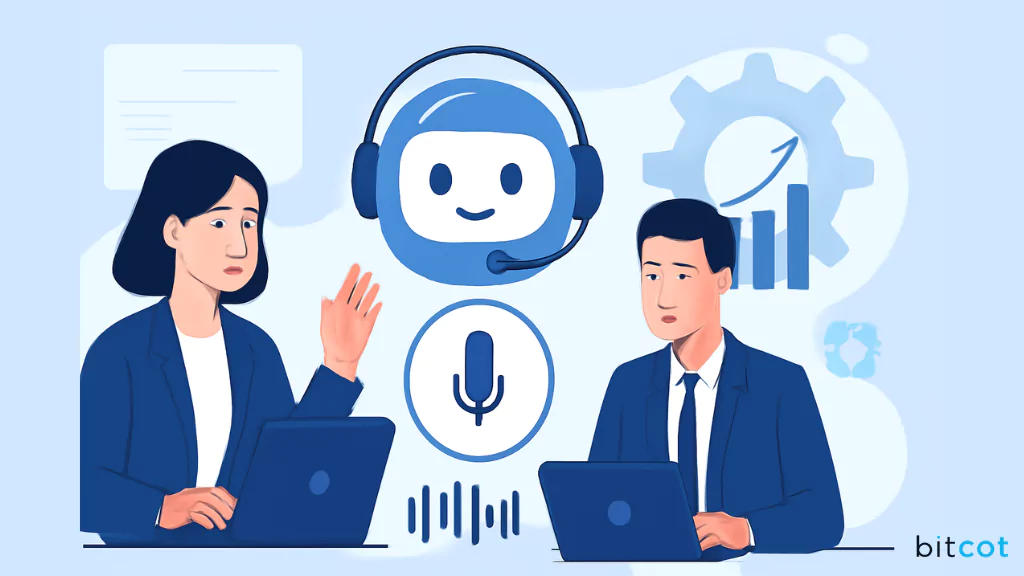
Voice AI agents aren’t just a “nice-to-have” tool; they’re a complete reimagining of how customer service can work at scale.
By replacing outdated bottlenecks with intelligent automation, they create a support system that is faster, more reliable, and more cost-effective.
Here’s how they transform the way modern businesses operate:
- Instant Scalability: Unlike human agents, who can only manage one conversation at a time, voice AI agents can handle thousands of interactions without breaking a sweat. That means whether your business faces ten calls on a slow morning or ten thousand during a product launch, every customer receives immediate attention. No wait times, no dropped calls.
- 24/7 Availability: Your business doesn’t stop when the office lights go out, and neither should your customer service. With voice AI agents, you can offer true around-the-clock availability. Customers from any time zone can reach out at any hour, whether it’s a late-night troubleshooting call or a weekend sales inquiry, and get the same consistent experience.
- Consistent Excellence: Humans are great at empathy but inconsistent at execution. Voice AI agents deliver uniform responses every single time, guided by your business rules, policies, and knowledge base. That means no variance in tone, no accidental misinformation, and no off-script detours. Every customer interaction reinforces your brand’s quality standards.
- Intelligent Integration: Voice AI agents aren’t siloed AI agent tools; they connect seamlessly with your existing systems. Whether it’s pulling customer history from your CRM, checking order status from a database, or updating records in real time, AI agents can access the right information instantly.
- Cost Efficiency: While building and deploying voice AI agents requires an initial investment, the long-term savings are significant. Once implemented, AI agents can perform at a fraction of the cost of human teams while handling exponentially more interactions. That means businesses can reduce overhead without sacrificing quality, freeing up resources to reinvest in growth.
Taken together, these benefits go far beyond “customer service improvement.” They represent a fundamental shift in how businesses operate. Voice AI doesn’t just remove friction from the customer experience; it unlocks new capacity, reduces costs, and creates resilience in a world where customer expectations never stop rising.
The real magic, though, lies under the hood: the sophisticated technology stack that makes all of this possible. From speech recognition to advanced machine learning, the power behind voice AI is what turns ambitious promises into practical, daily business results.
What Voice AI Development Technologies Power Enterprise Solutions?
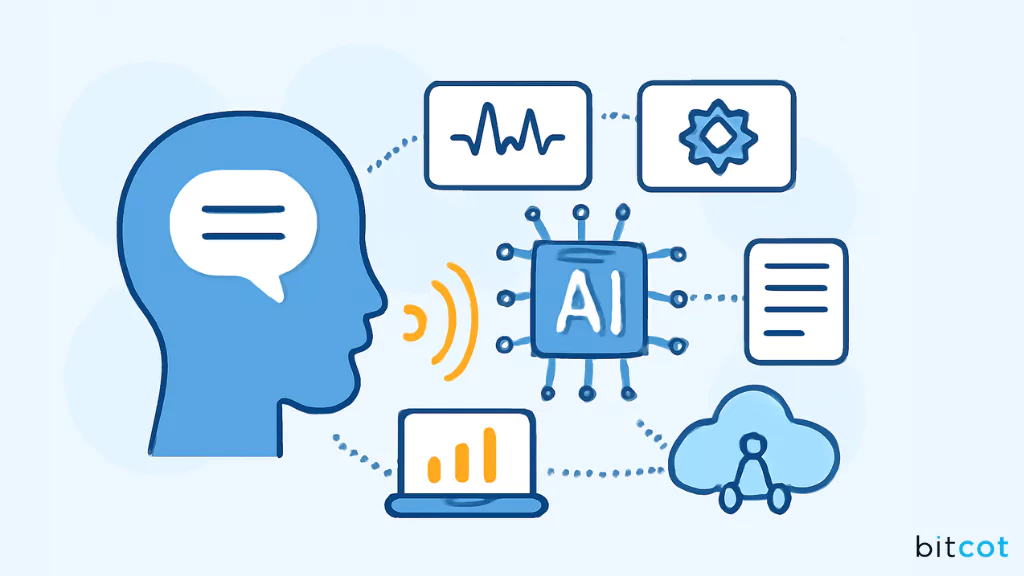
Behind every seamless customer interaction with a voice AI agent lies a sophisticated stack of technologies working together in real time.
These aren’t just off-the-shelf tools; they’re enterprise-grade systems designed to handle scale, complexity, and the nuances of human conversation.
For business leaders, understanding the building blocks is key to making smart decisions about implementation and partnerships.
Core Technologies and Frameworks
- Automatic Speech Recognition (ASR): The first step in any voice AI interaction is listening. ASR technology converts spoken words into text with remarkable accuracy. Today’s leading platforms, like Google Speech-to-Text, Amazon Transcribe, and Microsoft Speech Services, achieve accuracy rates above 95% in many use cases.
- Natural Language Processing (NLP): Once the words are captured, NLP takes over. This is the brain of the system, interpreting intent, context, and even sentiment behind what a customer says. Modern NLP frameworks, from transformer-based models like BERT to next-generation systems such as GPT, enable voice AI to move beyond keyword matching.
- Text-to-Speech (TTS): Conversations go both ways, which means voice AI also needs to speak. TTS systems generate natural-sounding speech that can mimic human tone, pacing, and inflection. Gone are the days of robotic, monotone voices; today’s TTS solutions sound warm, engaging, and easy to understand, making interactions feel comfortable for customers.
- Conversation Management: Behind the scenes, conversation management ensures that interactions flow logically. It remembers context across multiple turns, guides through processes, and handles complex branching paths based on business logic. This is what prevents the AI from sounding like it’s starting from scratch every time a new question is asked.
- Machine Learning Models: The best voice AI agents don’t stay static; they learn. By analyzing interactions, capturing feedback, and recognizing patterns, machine learning models continuously refine response accuracy. Over time, this means conversations get smoother, faster, and more aligned with customer expectations.
Integration Capabilities
- CRM Integration: For conversations to feel personal, the AI needs to know who it’s talking to. CRM integration allows agents to instantly access customer history, preferences, and purchase data, so every interaction feels tailored rather than generic.
- API Connectivity: Enterprise systems are rarely simple, which is why API connectivity is critical. Voice AI agents can connect directly with databases, ERPs, and third-party services to pull real-time information, like order tracking, account balances, or appointment scheduling, without requiring manual intervention.
- Analytics Platforms: Every interaction generates valuable data. Built-in analytics tools track key performance indicators like resolution time, satisfaction levels, and call volume trends. Leaders can use these insights to optimize processes, improve the AI’s performance, and make smarter operational decisions.
- Omnichannel Support: Voice AI isn’t confined to one platform. Whether customers reach out via phone, a mobile app, a website, or even a smart home device, omnichannel support ensures a consistent experience. This continuity builds trust and keeps customers engaged, no matter how they choose to connect.
While the technology stack forms the foundation, building enterprise-grade voice AI solutions requires more than just plugging in tools. Professional development services bring strategy, customization, compliance expertise, and continuous improvement processes to ensure that technology actually drives measurable business outcomes.
What Professional Voice AI Agent Development Services Include
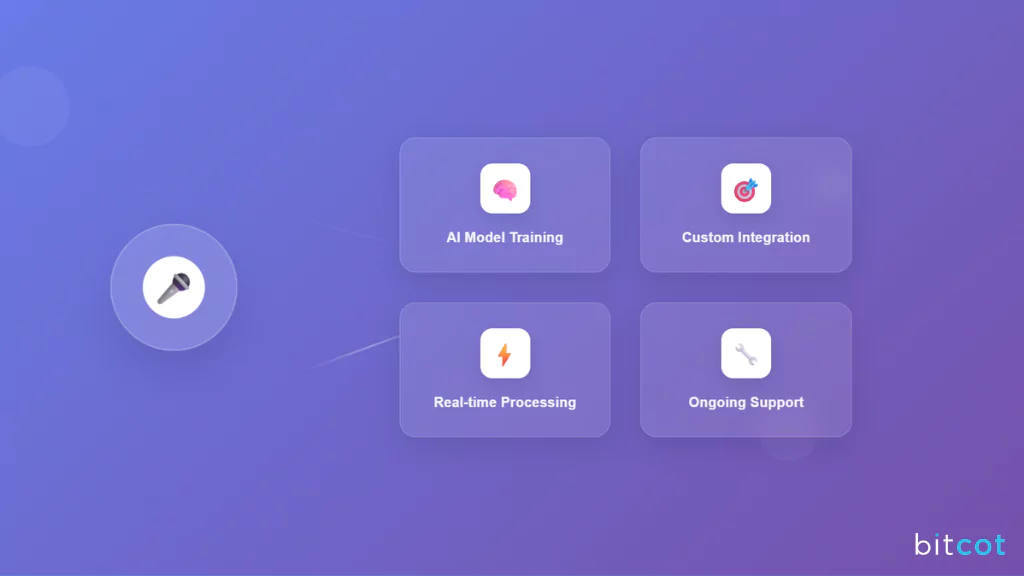
Building an enterprise-ready voice AI agent isn’t just about plugging in a few APIs and letting the system run.
Success requires strategy, design expertise, technical integration, and ongoing optimization. That’s why professional voice AI development services cover the entire lifecycle, from initial planning to long-term support.
Here’s what a full-service partnership typically includes:
Strategy and Consulting Services
- Business Requirements Analysis: Every business has unique challenges, customer expectations, and operational workflows. Professional teams start by conducting a deep dive into your current service setup, pinpointing bottlenecks, identifying inefficiencies, and uncovering opportunities where voice AI can deliver the most impact.
- Use Case Identification: Not every customer interaction needs automation. Consultants help you strategically prioritize high-impact use cases, like handling FAQs, appointment scheduling, or order tracking, where AI agents can drive quick wins and strong ROI without overcomplicating things.
- Technology Stack Selection: With dozens of ASR, NLP, and TTS platforms available, choosing the right combination can be overwhelming. Experts evaluate your infrastructure, budget, and goals to design a stack that balances performance, scalability, and cost efficiency.
- Implementation Roadmap: Rolling out voice AI in one massive launch is risky. Professionals craft phased deployment strategies that minimize disruption, deliver early wins, and build organizational confidence as adoption scales.
Design and Development Services
- Conversation Design: Crafting dialogue that feels natural takes more than just writing scripts. Specialists design conversation flows that reflect your brand’s voice, handle real-world complexity, and adapt smoothly when customers change direction mid-call.
- Custom Model Training: Generic AI models can only go so far. Professional teams train custom NLP models on your specific industry jargon, compliance requirements, and business processes, ensuring responses are accurate and context-aware.
- System Integration: Voice AI only creates value when it connects to the right data. Development teams handle integration with CRMs, databases, payment systems, and workflows so your AI agent can provide real-time, personalized responses.
- Voice Interface Optimization: From fine-tuning speech recognition to adjusting the tone and pacing of TTS responses, developers ensure every interaction feels effortless and natural for customers.
Testing and Quality Assurance
- Comprehensive Testing: Before deployment, systems are stress-tested under real-world conditions: different accents, dialects, background noise, and varying conversation styles. This ensures reliability in any environment.
- Performance Optimization: AI agents aren’t static; they evolve constantly. Professionals monitor and refine models, conversation flows, and system performance to maintain quality over time.
- Security Validation: Customer interactions often involve sensitive data. Robust security testing ensures compliance with industry standards like GDPR, HIPAA, or PCI-DSS, protecting both customers and the business.
- User Acceptance Testing: Real users test the system before launch to validate that conversations feel natural, business goals are met, and the agent performs as expected in practice, not just in theory.
Deployment and Support Services
- Infrastructure Setup: From cloud environments to monitoring dashboards and backup systems, professionals ensure the underlying infrastructure is secure, scalable, and resilient.
- Training and Documentation: AI agents are powerful, but your internal teams need to manage and evolve them. Training sessions and detailed documentation empower your staff to confidently oversee daily operations.
- Ongoing Maintenance: A voice AI agent isn’t “set it and forget it.” Continuous monitoring, system updates, and feature enhancements keep performance sharp and aligned with changing business needs.
- Analytics and Reporting: Professional services don’t just deliver the system; they help you measure its impact. Analytics dashboards track conversation quality, customer satisfaction, and efficiency gains, giving leaders actionable insights.
Comprehensive services like these don’t just ensure a smooth launch; they protect your investment over the long term. More importantly, they highlight why professional partnerships almost always outperform internal, DIY efforts.
The combination of expertise, proven frameworks, and ongoing optimization is what turns a voice AI initiative from an experiment into a lasting business advantage.
Why Choose Expert Voice AI Agent Development Services

Developing enterprise-grade voice AI agents isn’t a side project you can hand off to your IT department.
The complexity of building, training, and maintaining these systems demands specialized expertise that most organizations simply don’t have in-house.
Professional voice AI development services bridge that gap, offering the skills, resources, and proven processes needed to ensure successful implementation and long-term ROI.
Technical Expertise and Experience
- Deep Multi-Domain Knowledge: Professional developers aren’t just software engineers; they’re specialists who understand the unique challenges of speech recognition accuracy, natural conversation design, and enterprise-level system integration.
- Industry-Specific Knowledge: Every industry has its own nuances. Healthcare demands strict HIPAA compliance. Financial services require bulletproof security and audit trails. Retail needs scalable solutions that can handle seasonal surges. Experienced developers know these requirements inside and out.
- Proven Methodologies: Instead of reinventing the wheel, expert teams use established development processes, testing protocols, and deployment strategies. This reduces risk, creates predictable outcomes, and helps you avoid the trial-and-error pitfalls that slow down internal efforts.
- Technology Partnerships: Top development providers often maintain partnerships with leading technology vendors: Google, Amazon, Microsoft, and others. This means your business benefits from cutting-edge tools, early access to innovations, and preferential support channels that aren’t available if you go it alone.
Risk Mitigation and Compliance
Implementing voice AI isn’t just about functionality; it’s also about protecting sensitive customer data and staying compliant with regulations. Professional services providers bring the frameworks and oversight needed to reduce risk at every level.
- Data Security: From encryption to secure storage and transmission protocols, expert teams design systems that safeguard customer conversations end-to-end.
- Regulatory Compliance: Whether it’s HIPAA in healthcare, PCI-DSS in payments, or GDPR in Europe, compliance requirements can be complex and unforgiving. Professional developers design solutions with these standards in mind from day one, avoiding costly fines or reputational damage later.
- Scalability Planning: Your business won’t look the same in five years. Professional teams build with the future in mind, designing architectures that grow with you. without performance degradation or the need for expensive rebuilds.
Faster Time-to-Market
In today’s competitive landscape, speed matters. The longer it takes to get your voice AI agent live, the more opportunities your competitors have to capture your customers. Professional services dramatically shorten the timeline.
- Pre-Built Components: Instead of starting from scratch, development teams leverage proven frameworks, reusable modules, and accelerators that fast-track implementation while maintaining enterprise-grade quality.
- Parallel Development: Internal teams often work linearly; design, then build, then test. Professionals work in parallel, tackling multiple components simultaneously to compress timelines.
- Testing Automation: With automated testing frameworks already in place, issues are identified and resolved quickly, preventing costly delays at the final stages of deployment.
Choosing expert development services isn’t just about outsourcing technical work; it’s about investing in a partnership that reduces risk, accelerates delivery, and sets you up for long-term success.
With the value of professional services established, the next critical step is selecting the right development partner, one who understands your industry, your goals, and your vision for the future of customer experience.
How to Choose Voice AI Agent Development Company Partners
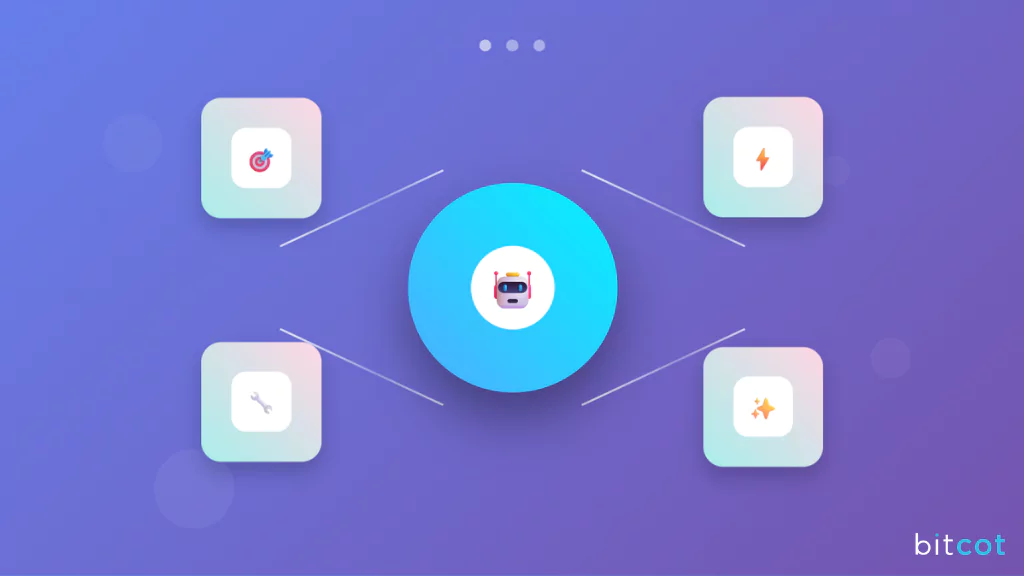
The partner you choose to build your voice AI agent can make or break your initiative.
Even the most powerful technologies fall flat without the right expertise guiding strategy, design, and execution.
That’s why business leaders need to carefully evaluate the top AI agent development companies across multiple dimensions, ensuring alignment not just on technical skills but also on industry understanding, long-term support, and cultural fit.
Technical Capabilities Assessment
- Portfolio Evaluation: Start by looking at a partner’s track record. Review case studies and past projects, especially those involving voice AI in enterprise contexts. Pay attention to the scale of deployments, the complexity of solutions, and the actual business outcomes achieved, not just the technical features delivered.
- Technology Stack Expertise: Voice AI depends on a sophisticated stack of technologies: ASR, NLP, TTS, machine learning, and integrations with cloud services. Your partner should demonstrate deep proficiency across these areas and familiarity with the platforms most relevant to your business (Google, AWS, Microsoft, etc.).
- Custom Development Capabilities: Beware of one-size-fits-all solutions. A strong partner should be capable of tailoring solutions to your specific requirements, whether that means building custom NLP models, integrating with unique legacy systems, or designing conversations that reflect your brand’s tone and values.
- Integration Experience: AI agents rarely work in isolation. Evaluate your partner’s ability to integrate seamlessly with CRMs, ERPs, payment systems, and other business-critical platforms. Smooth integration is what turns a “smart agent” into a true extension of your business.
Business Alignment Factors
- Industry Experience: Every industry has unique needs. A partner with direct experience in your sector already understands compliance requirements, customer expectations, and operational challenges. This accelerates development and reduces the risk of costly missteps.
- Scalability Track Record: Your business will grow, and your voice AI needs to grow with it. Look for evidence that your partner has delivered solutions capable of scaling to enterprise-level call volumes without compromising performance.
- Support and Maintenance: Launching your AI agent is just the beginning. Make sure your partner offers robust post-launch support: monitoring, troubleshooting, system updates, and continuous optimization. Clarify response times and escalation procedures to avoid surprises down the road.
- Communication and Collaboration: Technology projects succeed when teams work well together. Assess your partner’s communication style, project management approach, and willingness to collaborate with your internal teams. Transparency and alignment are just as important as technical skills.
Security and Compliance Standards
- Data Protection Measures: Customer trust depends on data security. Confirm that your partner has strict protocols for data encryption, secure transmission, and access control.
- Compliance Certifications: Different industries demand compliance with different standards like HIPAA, PCI-DSS, GDPR, and more. A credible partner should have relevant certifications and demonstrable compliance expertise.
- Security Testing Procedures: Ask how the company approaches vulnerability testing, penetration testing, and system hardening. Proactive testing is critical for preventing breaches before they happen.
- Incident Response Planning: Even the best systems face risks. Evaluate your partner’s incident response plans, recovery procedures, and business continuity strategies to ensure resilience under pressure.
Selecting the right partner isn’t about choosing the biggest brand name; it’s about finding the company that understands your business, shares your vision, and has the expertise to execute flawlessly.
And while capabilities are essential, so is alignment on practical matters like project timelines, deployment phases, and long-term ownership. Setting realistic expectations from the start will ensure a smoother path to success.
How Voice AI Agent Development Implementation Timelines Work
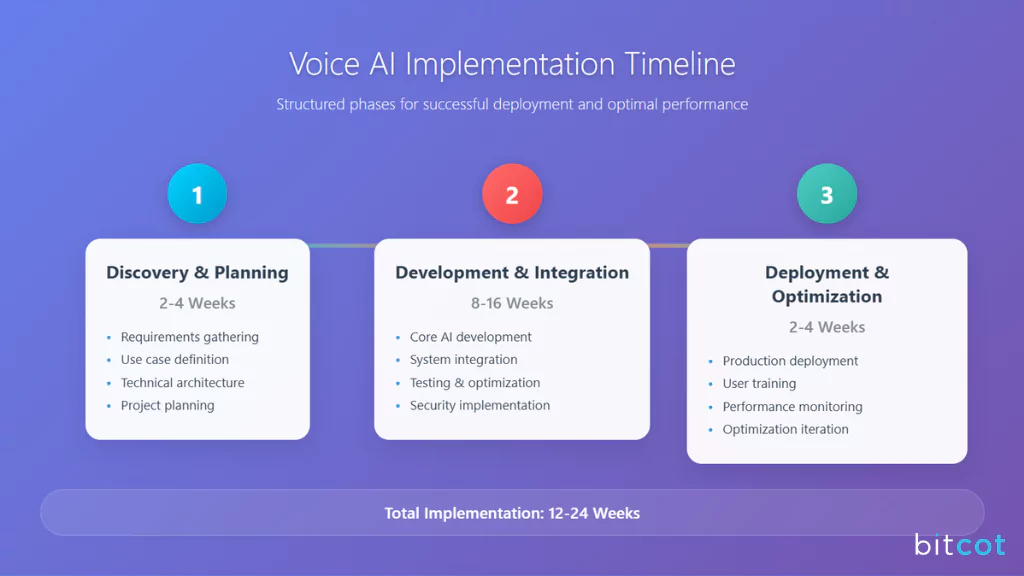
Understanding realistic implementation timelines is critical for business leaders.
A voice AI agent project isn’t just about writing code and flipping a switch; it follows structured phases designed to ensure smooth deployment, optimal performance, and measurable business impact.
Knowing what to expect at each stage helps leaders plan resources, align stakeholders, and avoid surprises.
Discovery and Planning Phase (2-4 Weeks)
- Requirements Gathering: The first step is understanding your business inside and out. This involves analyzing current processes, identifying pain points, and mapping out integration needs. The goal is to define exactly where voice AI can make the most impact.
- Use Case Definition: Next, the team outlines detailed capabilities for your AI agent. What types of customer interactions should it handle? How should conversations flow? Which metrics will measure success? Clarity here sets the foundation for everything that follows.
- Technical Architecture: Designing a robust system architecture is essential. This includes identifying integration points with CRMs, databases, and other systems, and planning for scalability so the AI can handle growth without degradation in performance.
- Project Planning: Finally, the team lays out a detailed timeline, allocates resources, and defines milestones. A clear plan ensures everyone, from developers to business stakeholders, is aligned on expectations.
Development and Integration Phase (8-16 Weeks)
- Core Development: During this phase, the AI agent is built. This includes conversation management, natural language understanding, and the integration of business logic to make the system context-aware and responsive.
- System Integration: Voice AI works best when it’s part of your broader ecosystem. Developers connect it to CRMs, databases, and workflows, ensuring seamless, real-time access to the information needed to answer customer queries accurately.
- Testing and Optimization: Testing is rigorous and multi-faceted, covering different accents, dialects, background noise, and scenario variations. Developers also optimize conversation flow and system performance to deliver smooth, natural interactions.
- Security Implementation: Security measures are applied and validated. Data encryption, access control, compliance checks, and other protocols ensure the system meets industry standards and protects sensitive customer information.
Deployment and Optimization Phase (2-4 Weeks)
- Production Deployment: The AI agent is carefully rolled out to the production environment, with close monitoring to catch any issues early and validate performance under real-world conditions.
- User Training: Internal teams receive training on system management, monitoring, and optimization. This ensures staff can confidently manage the AI agent and maintain high service standards.
- Performance Monitoring: Continuous monitoring tracks conversation quality, system responsiveness, and customer satisfaction, providing insights for iterative improvements.
- Optimization Iteration: Finally, the system is fine-tuned based on real-world usage patterns, feedback, and analytics, ensuring that it continues to improve over time.
Factors Affecting Timeline
- Complexity Level: Simple applications deploy faster than multi-system integrations with advanced business logic.
- Integration Requirements: Extensive integration with legacy systems or complex workflows can extend timelines.
- Customization Needs: Highly tailored solutions require more development and testing.
- Testing Requirements: Enterprise-level testing, especially in regulated industries, adds additional time.
While exact timelines vary based on project scope and industry, businesses consistently find that well-executed voice AI implementations deliver significant operational improvements, faster response times, and enhanced customer satisfaction.
Which Industries Benefit Most from Voice AI Agent Development Services?
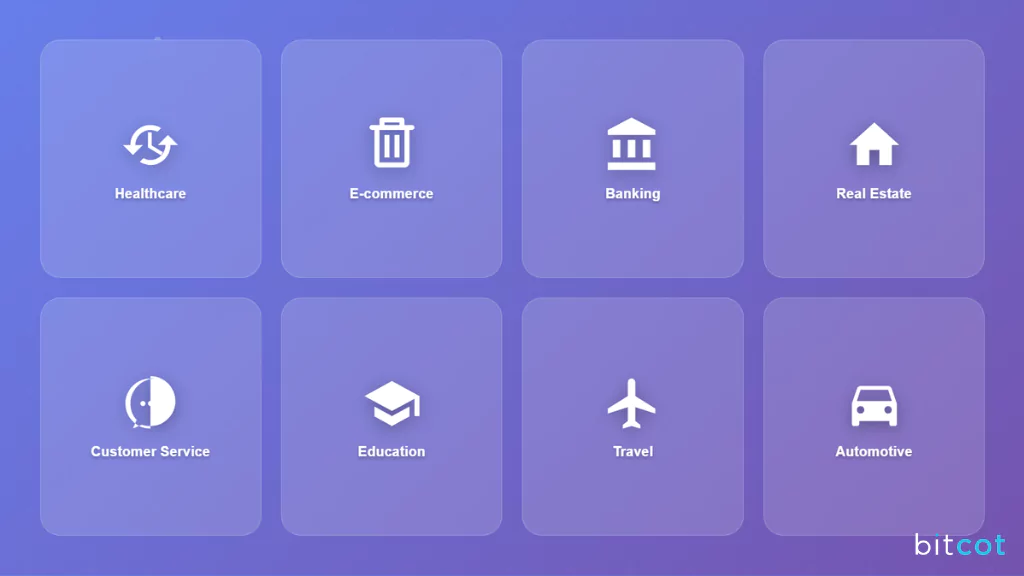
Voice AI agents aren’t a one-size-fits-all solution; they deliver transformative value across multiple sectors.
However, some industries see particularly dramatic results due to high volumes of customer interactions and processes that can be standardized or automated.
Financial Services and Banking
Banks, credit unions, and investment firms handle millions of inquiries every day, from checking balances to tracking transactions, applying for loans, or seeking investment advice. Voice AI agents allow these interactions to occur securely and efficiently, 24/7.
Key Benefits:
- Instant account access and balance inquiries
- Fraud alerts and risk notifications
- Loan pre-qualification and application guidance
- Investment recommendations and portfolio assistance
Compliance Advantages:
AI systems can automatically log conversations and enforce regulatory rules, ensuring every interaction meets stringent compliance requirements while maintaining detailed audit trails. This reduces risk while improving customer trust and operational efficiency.
Healthcare and Telemedicine
Healthcare organizations face a dual challenge: high patient demand and administrative bottlenecks. Voice AI agents help by handling routine tasks such as appointment scheduling, prescription refills, patient triage, and follow-up reminders, freeing staff to focus on critical care.
Key Applications:
- Symptom assessment and basic triage
- Appointment booking and reminders
- Prescription inquiries and refill management
- Post-treatment follow-up communications
HIPAA Compliance:
Professional AI development ensures all communications are secure, encrypted, and fully compliant with HIPAA standards, protecting patient privacy without slowing access to care.
E-commerce and Retail
Retailers use voice AI agents to improve customer shopping experiences while increasing operational efficiency. From order tracking to product recommendations, these agents provide fast, accurate assistance that drives sales and loyalty.
Revenue Impact:
- Instant product information and recommendations
- Order tracking and returns assistance
- Rapid resolution of customer issues, reducing cart abandonment
Inventory Integration:
AI agents access real-time inventory data, offering customers accurate availability information and suggesting alternatives when products are out of stock, keeping sales moving.
Insurance Industry
Insurance processes are often complex and document-heavy. Voice AI agents help simplify these workflows, providing faster responses to policy questions, processing claims, and managing payments.
Key Applications:
- Automated claims intake, status updates, and document collection
- Policy information retrieval and coverage explanations
- Premium payment processing and notifications
By handling routine, high-volume tasks, AI agents free human agents to focus on complex claims or customer counseling, improving satisfaction and reducing operational costs.
Telecommunications
Telecom companies face massive call volumes every day, from technical support to billing inquiries. Voice AI agents help manage these repetitive tasks efficiently, reducing wait times and freeing human agents for more complex customer interactions.
Key Applications:
- Automated troubleshooting and service guidance
- Billing inquiries, plan changes, and account management
- Service outage alerts and technical support
Operational Impact:
By automating high-volume, repetitive interactions, telecom providers lower support costs, improve customer satisfaction, and scale services to meet growing demand.
These industry applications demonstrate the clear operational and financial benefits of voice AI agent deployment.
But understanding the potential ROI also requires a realistic view of investment requirements and resource planning, a critical next step for business leaders preparing to implement AI solutions.
How Much Do Voice AI Agent Development Services Cost?

Voice AI agent development is an investment, and like any strategic business initiative, costs vary depending on scope, complexity, and customization requirements.
Understanding these factors helps business leaders budget effectively, evaluate potential ROI, and plan for both implementation and ongoing operations.
Development Cost Factors
- Project Complexity: Not all voice AI projects are created equal. A simple FAQ-style agent that handles basic customer questions might cost between $50,000 and $100,000. On the other hand, enterprise-level systems with advanced conversational logic, multi-system integrations, and large-scale deployment can range from $200,000 to $500,000, or even higher.
- Integration Requirements: Voice AI agents deliver the most value when connected to your business systems. Integrations with CRMs, databases, payment platforms, or other enterprise applications increase development effort and cost proportionally.
- Customization Level: The more tailored your AI agent, the higher the investment. Custom conversation flows, industry-specific terminology, and unique business rules require additional design, training, and testing to ensure accuracy and effectiveness.
- Technology Stack: Premium AI technologies, advanced NLP models, and enterprise-grade security features add to development costs but are critical for high-quality, reliable, and compliant performance.
Ongoing Operational Costs
- Cloud Infrastructure: Voice AI agents require hosting and processing resources. Depending on usage volume, storage, and computational complexity, cloud infrastructure costs typically range from $2,000 to $20,000 or more per month.
- Maintenance and Updates: AI systems evolve over time. Annual maintenance, including software updates, model retraining, and system optimization, usually costs 15–25% of the initial development investment.
- Support Services: Professional support ensures the system runs smoothly and issues are resolved quickly. Monthly service costs generally range from $5,000 to $15,000, depending on response time commitments and service levels.
Cost-Benefit Analysis
- Break-Even Timeline: Most businesses recover their initial investment within 6–18 months through operational efficiencies, reduced personnel costs, and faster resolution times.
- Long-Term Savings: By year two, annual savings often exceed the original development cost by 200–400%, creating substantial long-term value while freeing human resources for higher-value tasks.
- Scalability Economics: Unlike human teams, AI agents handle increased interaction volumes without proportional cost increases. As business grows, the economics of voice AI improve, making it a highly scalable investment.
Financing and Payment Options
- Phased Implementation: Staged deployment allows businesses to spread costs over time, demonstrate early wins, and build internal confidence in the system’s effectiveness.
- SaaS Models: Some providers offer subscription-based models, reducing upfront costs while giving predictable monthly expenses and easy scalability.
- Performance-Based Pricing: Results-driven pricing models tie vendor compensation to the AI agent’s performance, aligning incentives and reducing implementation risk for your business.
With costs and ROI considerations clearly understood, the next step is action, moving from planning and evaluation to launching your voice AI transformation journey.
Partner with Bitcot to Build Your Custom Voice AI Agent
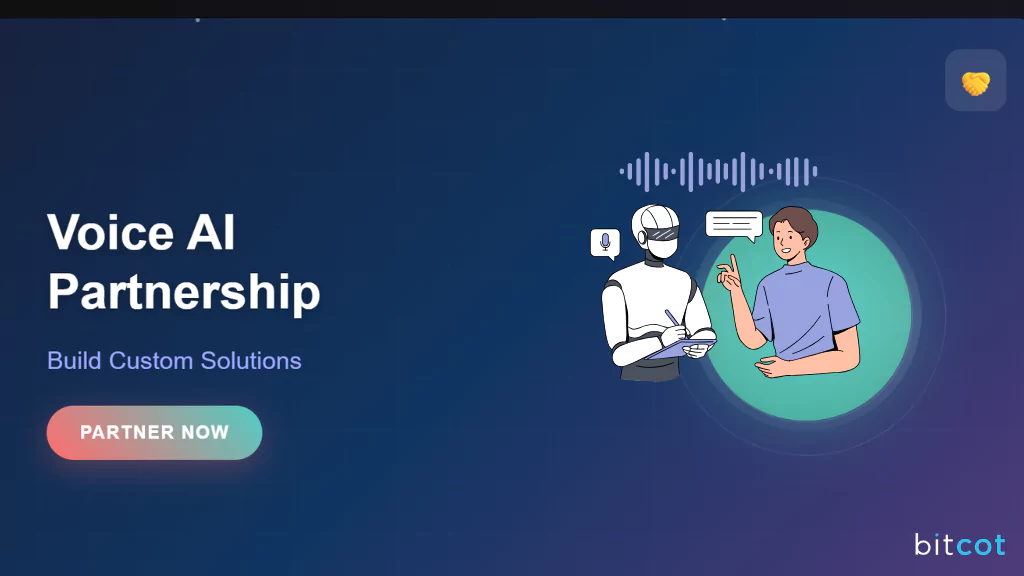
Bringing a voice AI agent to life requires more than just technology; it requires expertise, strategy, and a partner who understands how to turn innovation into measurable business results.
That’s where Bitcot comes in.
Our voice AI agent development services combine deep technical knowledge with proven implementation methodologies, delivering enterprise-grade solutions that drive real impact.
Across industries, from finance and healthcare to retail, insurance, and telecommunications, Bitcot has helped businesses transform customer experiences, streamline operations, and achieve tangible growth. Every solution we deliver is tailored to your unique business processes, ensuring your AI agent not only functions effectively but also aligns with your brand and strategic goals.
Serving California’s Leading Business Hubs
Bitcot provides comprehensive voice AI services throughout California, including Los Angeles, San Francisco, San Diego, San Jose, Sacramento, Fresno, Long Beach, Oakland, Bakersfield, and Anaheim.
Our local presence allows us to respond quickly, understand regional market nuances, and offer hands-on support whenever you need it.
Getting started is easy. Contact Bitcot to discuss your voice AI agent requirements and receive a customized implementation roadmap. Our experts will:
- Assess your specific business needs and operational challenges
- Recommend the optimal technology stack and design approach
- Provide detailed ROI projections tailored to your objectives
With Bitcot as your partner, your business can move confidently into the future of customer service, delivering faster, smarter, and more personalized interactions that set you apart from the competition.
Final Thoughts
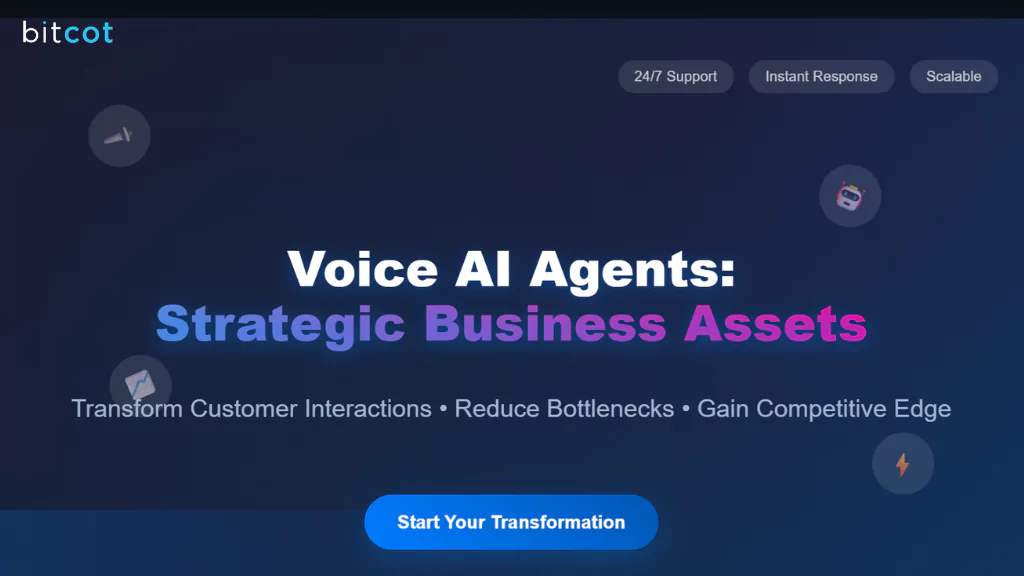
Voice AI agents are more than just technological innovations; they are strategic business assets. They reduce operational bottlenecks, improve customer satisfaction, and create sustainable competitive advantages. The question for today’s business leaders isn’t if to implement voice AI, but how quickly you can deploy it effectively.
Your Next Steps:
- Assessment: Start by evaluating your customer service operations. Find high-impact areas where voice agents can quickly boost efficiency, response times, and customer satisfaction.
- Partner Selection: Choose an experienced voice AI development partner with proven enterprise expertise in your industry.
- Pilot Program: Begin with a focused pilot program. This lets you demonstrate tangible value, gather actionable feedback, and build confidence among internal teams and stakeholders.
- Scale Strategically: Use insights from the pilot to expand voice AI capabilities across departments and channels. Continuously refine workflows based on customer feedback.
The competitive landscape has shifted; customers now expect instant, personalized support. Businesses that delay voice AI risk falling behind agile competitors already leveraging intelligent automation. Those who embrace voice AI today will thrive tomorrow; every day of delay gives competitors an edge. Don’t let outdated support models hold your business back.
Transform your customer interactions with intelligent voice AI agents that operate 24/7, scale effortlessly, and deliver consistent excellence every time.
Schedule your consultation with Bitcot now and join the forward-thinking organizations already gaining a competitive edge through professional voice AI agent development services.



